Take-aways from our presentation for the Academic Business Club of Tilburg University.
16 insights 9 years of business taught us

Stijlbreuk is a digital agency that we built from scratch. We’ve been going and growing for almost 10 years now. During that period, we have learned more lessons than we have time to discuss today. So, we have condensed the most important things we’ve learned into this shortlist of 16 insights.
At first glance you might think that some of these insights apply to digital agencies only. But I hope you can keep an open mind. Often, a fundamental truth lies at the heart of a piece of advice. A lesson that can be applied regardless of context. It’s our duty to share our insights with you. But it’s up to you to put them to good use.

1. Take the leap
Taking the risk to start a business becomes harder as you grow older. The younger you are, the less responsibilities you have. No kids, no mortgage, and energy to spare. Believe it or not, but these are the cheapest years of your life. If there was a perfect time to start a business, it would be now. The longer you wait, the harder it becomes.

2. Trust is priceless
Many people mistakenly believe that trust is a spectrum. It’s not. Either you trust someone, unconditionally, or you don’t. There’s no in-between. Stijlbreuk was founded by three friends, so trust between the founders came natural. We’ve taken this for granted too often, because trust is and always has been our status quo. But it’s not guaranteed for everyone starting a business. The lesson here is: find business partner(s) you truly trust, and reward the people who choose to trust you. Deep down, you know how to do this. Listen to your heart and your gut; they will tell you who to trust, and they will tell you how to be trustworthy.

3. Shout it from the rooftops
You’re starting a business. This is big news! An admirable step. It might be scary to shout it from the rooftops, but you should. New opportunities tend to come from unexpected directions, so the first thing you should do is make sure everyone knows you are in business. Friends, family, former employers — everyone. The more people that know, the higher your chances of succeeding. Simple word-of-mouth is how we landed our first few jobs.
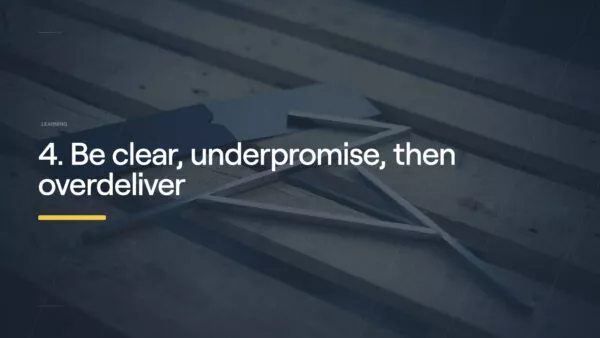
4. Be clear, underpromise, then overdeliver
There is always a gap between what you say and what the client hears. Their expectations tend to be higher and more vibrant than what you’ve actually promised. To account for this, you need to be crystal clear. Explain, in detail, what the client can expect. Don’t leave room for interpretation — the client will always generously fill in any blanks you leave open.
In addition, underpromise. Don’t set the bar low, but don’t set yourself up for failure either. Clients don’t like surprises, unless the surprise is that you’ve finished early, under budget, or — our favorite — you’ve gone the extra mile. By slightly underpromising, you make it much easier to achieve this.

5. Hire graduate interns
Graduate interns are the uncut diamonds of the industry. Sure, it takes some filtering (and applying a little pressure) on your side — but if you pick the right one, you will be rewarded with an eager, energized apprentice, waiting to prove themselves. In addition, interns are much cheaper than regular hires, so they are a low-risk way of growing familiar with being an employer. And if they’re really as good as you hoped, you can offer them a job after their internship. At Stijlbreuk, our first two interns were graduates, and the second one became our very first full hire. Three of our core team members began their journey as interns.
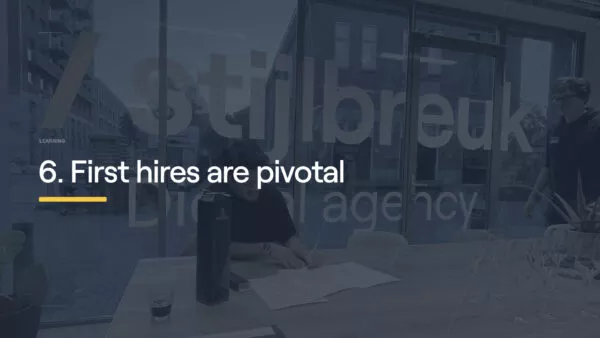
6. First hires are pivotal
Speaking of first hires: they are crucial. Even if your company has as many as three founders, that first hire is an expansion of 33%. That’s enormous! A leap you will never match.
Because you’re expanding your business by 33%, 50%, or perhaps even 100%, you shouldn’t take this hire lightly. Preferably, this person is multidisciplinary, billable from the start, and their ethics and vision align seamlessly with the company’s core values. Not only will this make them valuable and fun to work with — it will also allow them to grow with the company, making them prime candidates for leadership roles in future phases.
Yes — this is quite the challenge. You’re searching for a needle in a haystack while under pressure. But given what this hire can bring to the company, it’s totally worth giving it your best shot.
As said, our first hire (hi Paul!) was our second graduate intern. Because he had been around for a while, we were able to really get to know him, his attitude, and his work ethic. After 9 years, we’re proud to say that he’s still with us.
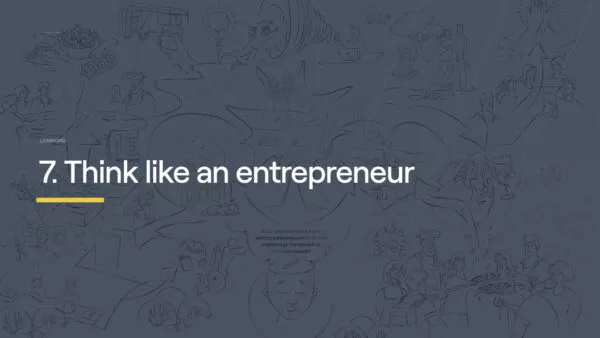
7. Think like an entrepreneur
7a. Make your business a vehicle for your life
It’s tempting to separate your business from your personal life. It’s also tempting to focus on the business too much, and on your personal life too little. We’ve been there.
But in the end, you are you. The things you want from life will eventually creep into your business. Your dreams are stronger than your entrepreneurial spirit. Eventually, you will want the things money can’t buy. Things your business can’t give you.
Unless, instead of hosting a tug-of-war between work and life, you combine them. Make your business a vehicle for getting to the places in life you want to go. It’s your business. You decide. You’re free to do things however you please.
7b. Define happiness
To help our team (founders and colleagues) clarify what makes us happy, we apply a method called “The Perfect Day”. During an extensive whiteboard session, everyone works towards defining what their perfect day at work look like.
This helps us uncover our individual core values. Once we are aware of what drives us, it becomes easier to mould our way of working around it. Besides, doing these sessions together really goes a long way in getting to know each other even better.

8. Define your core values and articulate your vision
In order to grow, you need a solid team. But as a young company, you don’t have the financial means to attract highly experienced, senior team members.
Instead, you should focus on building a vibrant, healthy culture based on a strongly articulated vision and clear core values. A shared purpose.
This will attract like-minded talent that will grow and flourish as the company matures. It will function as a natural filter, making sure that everyone at the company matches really well.
At Stijlbreuk, our core values are: drive for improvement, vibe, trust & candor, ownership & commitment, and design thinking. What are yours?

9. Pick a size
Agency size is not simply a linear metric. Some sizes are more balanced than others, and the number of people you employ directly affects how the outside world sees you and the type of work you can (and can’t) take on.
Therefore, you should have a clear plan on how big you want to grow. Needless to say, bigger isn’t always better. As numbers grow, culture changes, some risks go down while others go up, and profit margins fluctuate.
The average profit margin for digital agencies is 10% (DDA). That means for every 1M in revenue, agencies will spend around 900k to get there. At Stijlbreuk we ambitiously aim at a 20% profit margin with relatively small team. This will hopefully enable us to create our own digital product in the future.

10. Don’t lose sight of value
Agencies such as ours tend to revolve around billable hours. This is both a blessing and a curse. On one hand, billing by the hour is low-risk and super transparent. You do more work, you bill more. But at the same time, hourly billing has a pretty low ceiling. It doesn’t reward efficiency (doing more in less time), and it focuses purely on cost, not on value.
The cost of a provided service is the number of hours times your hourly rate. Assuming you are good at what you do, however, the value of what you create is much higher than that. In addition, the only way to rack up more billable hours is to hire more people. It scales linearly.
There are a few ways out of this ‘trap’. For one, you can start talking to your clients about value instead of cost. This way, you can negotiate bigger budgets and create more room for quality.
In addition — this is what we’re doing — you can try to create and sell digital products. This scales much better. After all, 10X-ing your sales doesn’t require you to 10X your efforts.

11. Work in and on your company
When you co-found your company, it’s very likely that you will be your first employee, delivering much of the work yourself. That’s fine — but it’s not sustainable in the long term.
Companies of any size need people working in the company (e.g. doing the work), and people working on the company. As your company matures, you should gradually shift your attention from the former to the latter.
We lost track of this for a while. As a result, our growth declined while we were working our asses off. A book that really helped us regain focus is (don’t mind the cringy title): “The E-Myth Revisited: Why Most Small Businesses Don’t Work and What to Do About It” by Michael E. Gerber.

12. It’s your job to fire yourself
As mentioned, in the beginning you will be tackling a lot of different tasks in the company. Marketing, sales, grocery shopping, event planning, HR, operations — the list is almost demoralizingly long.
The good news is: your long-term goal is to fire yourself from all of this stuff. Make yourself obsolete to the operation. This is a step-by-step process that starts by finding tasks you don’t enjoy and delegating, automating, or eliminating them.
Not only will you live a happier life — your company’s value will increase as well. This is great when the day comes you want to sell or merge.
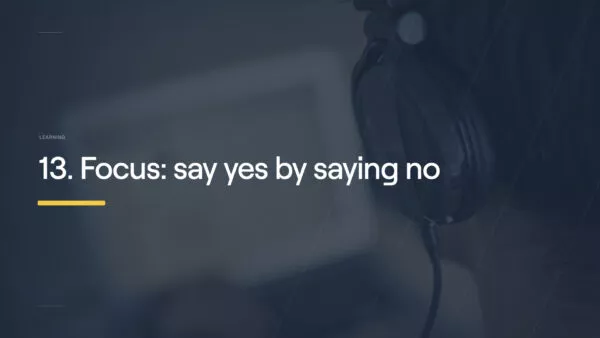
13. Focus: say yes by saying no
It’s tempting to take on any business you can get. In the short term, this can be good for cashflow and keeping busy. But not being selective enough — e.g. providing a lot of different services to a lot of different markets — will blur your proposition.
It will become unclear to potential buyers what you do, and why they should hire you. Our mistake was offering pretty much anything with a digital aspect: marketing, websites, physical products, lighting installations. People told us “You are obviously very smart and motivated people, but I have no idea what you are offering me.” That hurt. But it also urged us to refocus our services.
In the end, you learn to say “yes” confidently to the clients you really want to work with by saying “no” to those you don’t. You will become a respected expert in a specific field instead of a handyman for anything simple.

14. Prepare for friction
There will always be something that needs work. And once you feel you’ve overcome all obstacles, something unexpected will happen. This isn’t pessimism, it’s the reality of entrepreneurship. It is what you signed up for.
2021 was our best year ever — by a landslide. Revenue skyrocketed as a result of a couple of big projects. We did a lot of things very well, and we overshot our predicted growth quite a bit. At the same time, this pinnacle highlighted a weakness in our organization.
The big projects all came from one referral within our network. That’s not a sustainable marketing machine. It’s not a solid system we can depend on. So while our revenue grew, our marketing machine didn’t. Quite the opposite: the high volume of work overshadowed the need to work on our marketing.
Because the founders of Stijlbreuk are builders by nature, friction emerged on the sales-side of the business. By contrast, agencies with sales-oriented founders tend to have a surplus of work but no processes to deliver quality solutions consistently.
So, whatever your forte: friction is a given.
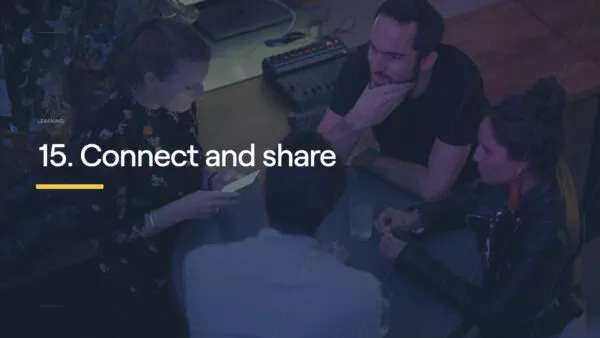
15. Connect and share
Especially in the beginning we spent way too much time in our own, safe bubble, focussing only on “the work”. It’s part of our somewhat introverted nature. But the truth is that talking to others, sharing knowledge, and connecting with like-minded people is often underestimated.
One of the reasons for this is that new connections take a while to develop, and take even longer to really yield measurable results. But not all results have to be measurable in order to be valuable.
As soon as you talk to others, you will find that many people struggle with the same challenges you do. Some of them have recently overcome the stuff that you face today. Finding a mentor is priceless. Preferably someone who is years, not light-years ahead of you, as their insights will be more relatable.
And then there’s sharing. Even for us (somewhat introverted tech guys), it’s incredible how educational it is to share our own experiences. By preparing information to be presented to others, you force yourself to sit down and really understand what you’re trying to say. That, in itself, is an exercise anyone would benefit from.

16. Enjoy the ride
As Naval Ravikant said: make a business out of something that feels like play to you, and like work to others. At the core of this idea lies fun. You owe it to yourself — but also to the people you hire and your clients — to enjoy the ride.
Those who work for fun will effortlessly outperform those who work for money. But moreover, you will need a positive, joyful mindset to stay in business.
Because, let’s be honest: it’s not easy. You’re building a track with a moving train on it. There’s constant pressure with frequent setbacks and unexpected issues at every turn. Whatever happens, your first response should be: “How can I improve this?”
So, while you embrace the struggle, don’t forget to enjoy the ride.
Recommended reading
- The E-Myth Revisited – Michael E. Berger
- Traction – Gino Wickman
- The Almanack of Naval Ravikant – Eric Jorgenson
- No rules rules – Reed Hastings
- Built to sell – John Warrillow
- Create and orchestrate – Marcus Whitney
- Scaling up – Verne Harnish
- The five dysfunctions of a team – Patrick Lencioni
- The hard thing about hard things – Ben Horowitz
